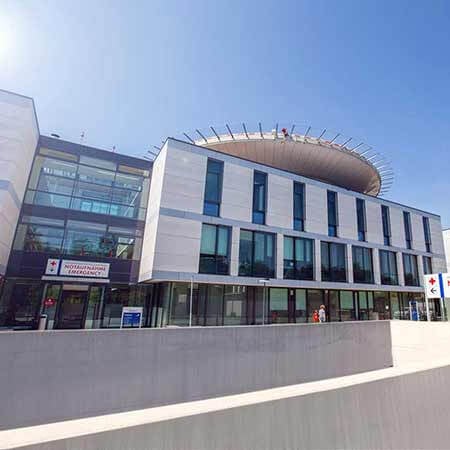Primary pulmonary lymphoma (PPL) is a rare disease and only accounts for up to 4% of all extranodal lymphomas. Basically, it is a different variant of B-cell lymphoma. The disease often develops in older patients. The median age at the time of diagnosis is 60 years. Doctors in developed countries successfully deal with the treatment of the disease, even at advanced stages, using the latest drugs. They use not only chemotherapy, but also targeted therapy and immunotherapy. If you are going to have your treatment abroad, the Booking Health service will be very helpful for you. Here, you can find out the cost of treatment and make your appointment at the hospital at the best possible price.
Content
- What is pulmonary lymphoma?
- Principles of treatment
- Surgical interventions
- Radiation therapy
- Chemotherapy
- Immunotherapy
- Stem cell transplant
- Where to undergo your pulmonary lymphoma treatment?
What is pulmonary lymphoma?
The term primary pulmonary lymphoma means that the tumor first developed in the lung tissue, and did not spread to the organs of the respiratory system from other parts of the body.
There are many lymph nodes and blood vessels in the lung parenchyma, and the lymphatic system is divided into separate categories:
- system of radical and intraparenchymal (in the lung tissue) lymph nodes;
- bronchus-associated lymphoid tissue;
- peripheral lymphoid accumulations, single lymphocytes, and phagocytes near the bronchi and bronchioles.
Malignant tumors can grow from these elements. The most common form of primary pulmonary lymphoma is MALT lymphoma. Less common are other diseases, such as lymphomatoid granulomatosis, primary pulmonary diffuse large B-cell lymphoma, primary effusion lymphoma, and intravascular large B-cell lymphoma. Approximately 80% of all cases are MALT lymphoma.
Principles of treatment
Most primary pulmonary lymphomas are not aggressive. The survival rates of patients with these neoplasms are much better than those with lung cancer. This is especially true for MALT lymphoma. The five-year tumor-specific survival of patients with this disease is 90%, and the ten-year survival makes up 70% of these.
Treatment options:
- surgical removal of single tumor foci or those located in the peripheral parts of the lung;
- radiation therapy;
- chemotherapy.
Immunotherapy is usually used in addition to chemotherapy. It can also sometimes be used as a standalone treatment method, providing the complete elimination of tumor foci in 70% of patients, but in half of these, the disease recurs. Therefore, this treatment option is chosen in patients with comorbidities, those who cannot tolerate the optimal chemotherapy regimen. Such cases are not uncommon, since the average age of patients with MALT lung lymphomas is 68 years.
Surgical interventions
Surgery is considered one of the main treatments for pulmonary lymphoma, but it is rarely used as the only method of treatment. It is usually part of a combination treatment. A surgical intervention is followed by chemotherapy for cancer, since without it, the risk of recurrence even after a complete tumor removal reaches 50% within 3 years.
Most surgical interventions are performed for MALT lymphoma. For other types of tumors, operations are extremely rare.
Here are some surgery options which are used depending on the volume of lung tissue to be removed:
- a lobectomy is a surgical procedure to remove a lobe of the lung (this is either a half or third of the lung);
- a segmentectomy is a surgical procedure to remove a lung segment with a tumor (each lobe consists of several segments);
- non-anatomic resections involve the removal of a section of the lung without any anatomical landmarks, in combination with plastic surgery of the large blood vessels and bronchi (this allows doctors to save more lung tissue);
- a pneumonectomy is a rare operation for lymphoma, which involves the removal of the entire lung.
Not all older patients with comorbidities can undergo open surgery. But, doctors in developed countries use more sparing interventions, such as video-assisted thoracoscopic and robot-assisted operations. These are performed through short incisions in the chest, which shortens the recovery period and reduces the risk of complications.
Radiation therapy
Most types of lung lymphomas are sensitive to radiation. Radiation therapy is mainly used to treat early-stage lymphoma, when surgery is contraindicated. Radiation therapy is usually followed by chemotherapy for cancer to reduce the risk of recurrence.
The problem with radiation therapy for lymphoma is as follows:
- the tumor can lie deep in the lung tissue, far from the surface of the chest, so the radiation needs to travel a long distance to get to the target, and this increases the radiation exposure of the body;
- the tumor constantly shifts, as the chest moves with breathing;
- the tumor is often surrounded by critical organs, such as the esophagus, heart, and large blood vessels.
To avoid damage to healthy lung tissue and organs located near the lungs, modern methods of irradiation should be used. These are available in developed countries. Physicians offer intensity-modulated radiation therapy, image-guided radiation therapy, stereotactic radiation therapy, volumetric modulated arc therapy, and some specialized centers also use proton therapy, which is the safest option for irradiating deep-seated tumors. Additionally, normal lung tissue lesions are reduced by systems that synchronize the radiation with the patient's breathing.
Chemotherapy
Chemotherapy for cancer of the lymphoid tissue is the main treatment method, and either cures the disease completely or transfers it into long-term remission. Chemotherapy for cancer is prescribed either after surgery and radiation therapy, or as the first, and often the only, treatment.
The most effective regimens of chemotherapy for cancer are CHOP, CVP, and FCM. The CHOP regimen has gained the greatest popularity among physicians, as it has the highest efficiency and low toxicity levels. Most patients tolerate the treatment well. The scheme includes glucocorticoids, which help to quickly reduce the size of the tumor and get rid of the most severe symptoms. Monoclonal antibodies are often added to the CHOP regimen, and as such, the regimen of chemotherapy for cancer is referred to as R-CHOP.
Immunotherapy
When conducting immunotherapy for pulmonary lymphoma, patients are prescribed drugs from several pharmacological groups.
CD20 antibodies are basic drugs for immunotherapy and these are used jointly with chemotherapy for cancer, as a first-line regimen. The drugs are usually given intravenously over several hours. Developed countries have also begun to use new subcutaneous dosage forms, so that the injection only takes a few minutes. In most patients, CD20 monoclonal antibodies do not cause any severe side effects. These antibodies can even be used in patients with severe comorbidities.
CD19 antibodies are used for lung diffuse large B-cell lymphoma, which accounts for about 10% of all pulmonary lymphomas. These drugs are combined with immunomodulators. This scheme is used in patients with contraindications for stem cell transplant, and if standard chemotherapy for cancer no longer works. Monoclonal antibodies are administered intravenously, once a week, for several months, and then doctors switch to a maintenance regimen, once every 2 weeks.
Antibody-drug conjugates work even better than conventional monoclonal antibodies. Doctors combine a chemotherapy drug with a CD19 antibody. As a result, the drugs are delivered directly to the cancer cells. This makes chemotherapy for cancer more effective.
CD79b antibodies are used for relapses, as a third-line treatment option. The antibody-drug conjugate delivers chemotherapy drugs to the lymphoma cells in lung tissue that contain the CD79b protein. The drug is administered every 3 weeks.
Chimeric antigen receptor (CAR) T-cell therapy is a rarely used treatment method for lung lymphoma. It is mainly used for severe forms of the disease, when the tumor has recurred and patients have not responded to other treatments. White blood cells are harvested from the patients, then modified, multiplied, and injected back into their body. The altered immune cells penetrate the lung tissue, spread throughout the body, and attack the tumor. The treatment results in the disappearance of the tumor foci or a reduction in their size.
Stem cell transplant
Pulmonary lymphoma which has recurred or cannot be cured by other methods, can be treated with a stem cell transplant. The following two types of procedure can be carried out:
- an autologous stem cell transplant involves the use of the patient's own cells;
- an allogeneic stem cell transplant involves the use of donor cells.
When carrying out pulmonary lymphoma treatment, an autologous transplant is usually used. The patient receives high-dose chemotherapy for cancer, which destroys the tumor foci. This also damages the bone marrow. Subsequently, to restore it, the patient is injected with his own, previously harvested stem cells.
An allogeneic transplantation can be used when the tumor recurs after an autologous bone marrow transplant. This transplant procedure successfully cures even the most severe cases of pulmonary lymphoma. The procedure is not safe. To avoid complications, it is better to undergo this in a good hospital abroad. After the transplantation of donor stem cells, the patient's immunity is renewed, so the newly formed immune cells attack the tumor and destroy all of the lymphoma foci in the body. A successful stem cell transplant can often cure the disease once and for all.
Where to undergo your pulmonary lymphoma treatment?
You can get an oncologist consultation and undergo your pulmonary lymphoma treatment abroad, in one of the best hospitals in the world. There are a few reasons for you to undergo your treatment abroad:
- Highly accurate diagnostics that will help to determine the type of lymphoma and clarify its location and the stage of the disease in order to choose the best treatment option.
- Doctors perform minimally invasive, video-assisted thoracoscopic and robot-assisted operations, which can shorten the recovery period for patients and reduce the risk of complications.
- The use of the latest radiation therapy options, which hardly damage healthy tissue in the patient's body, but completely destroy the tumor.
- Modern chemotherapy regimens that demonstrate a high rate of complete response to treatment (disappearance of all the tumors in the body).
- In addition to chemotherapy, immunotherapy and sometimes targeted therapy can be used to achieve better results when dealing with aggressive types of lymphomas.
- Foreign hospitals offer innovative treatment methods, such as CAR T-cell therapy and stem cell transplants, which help to cure lymphoma, even at its advanced stage.
You are welcome to make your treatment appointment abroad at the best price using the Booking Health service. On our website, you can compare the cost of treatment in different hospitals. If you make your appointment at a hospital through the Booking Health service, then the cost of your medical services will be lower, due to the lack of additional fees for foreign patients.
Authors:
The article was edited by medical experts, board certified doctors Dr. Nadezhda Ivanisova and Dr. Sergey Pashchenko. For the treatment of the conditions referred to in the article, you must consult a doctor; the information in the article is not intended for self-medication!
Sources:
National Center for Biotechnology
Cancer Research Institute
American Cancer Society










